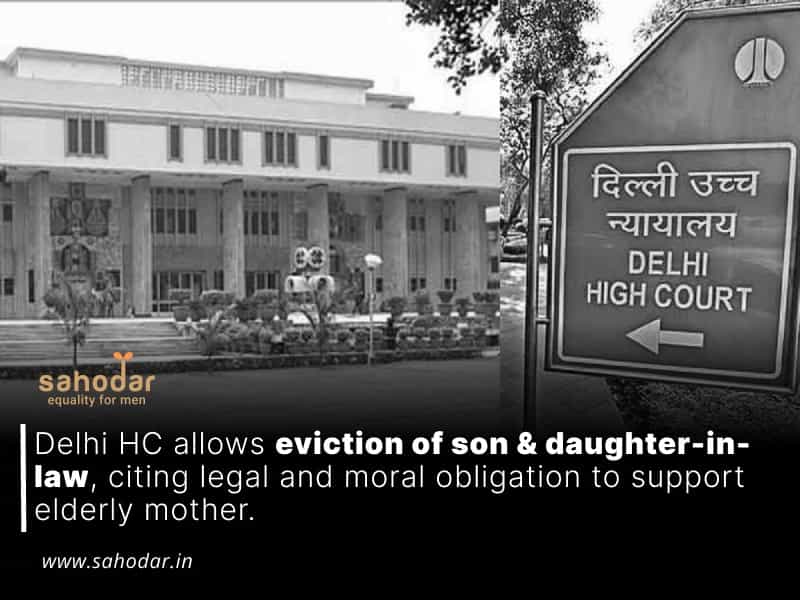The Delhi High Court, underscoring the filial obligation to provide for elderly parents, acceded to the plea of a senior citizen for the eviction of her son and daughter-in-law.
Despite contentions regarding property ownership and the service of legal notices, the Court adjudicated in favor of the senior citizen (petitioner), granting her application for eviction pursuant to Rule 22 of the Delhi Maintenance and Welfare of Parents and Senior Citizens Rules, 2009.
The petitioner sought the expulsion of her son (Respondent 2) and daughter-in-law (Respondent 3) from her premises under the provisions of the Maintenance and Welfare of Parents and Senior Citizens Act. The petitioner cited maltreatment as grounds, asserting her inability to reside tranquilly within her own domicile.
Following the dismissal of the petitioner’s appeal by the Appellate Authority, a subsequent writ petition challenging said decision was submitted.
A Bench of Justice Subramonium Prasad held, “The Senior Citizens Act, 2007 was enacted with the objective to provide a mechanism to secure maintenance and ensure welfare of senior citizens left bereft of support, financial or otherwise. The Act being a social legislation, ought to be construed liberally and its provisions should be implemented in light of the aims and objectives with which the Act was enacted, which for all intents and purposes in the immediate case herein is to ensure that a senior citizen without any semblance of support is not further deprived of the property and so that there is no threat to their life.”
Advocate Aakansha Kaul appeared for the Petitioner and Advocate Udit Malik appeared for the Respondents.
The Court, after considering arguments from both sides, emphasized the objectives of the Senior Citizens Act, which aims to protect the interests of senior citizens. It highlighted the duty of children to maintain their parents, especially in cases where the senior citizen has no independent source of income. The Court added, “It is moral and legal obligation of every son to maintain his mother. In fact Section 4(2) of the Senior Citizens Act casts an obligation on the children to maintain a senior citizen so that senior citizen may lead a normal life. Though the Petitioner has not claimed a right to be maintained, the fact that the Court had passed an order on 21.04.2023, even if it is presumed that it was in the absence of service to the Respondents, it is still the obligation of the Respondents to comply with the directions passed by the Court.”
Notwithstanding the controversies surrounding property ownership and the service of legal notices, the Court adjudicated in favor of the Petitioner, thereby sanctioning her application for eviction in accordance with Rule 22 of the Delhi Maintenance and Welfare of Parents and Senior Citizens Rules, 2009.
The Court further said, “The refusal of the Respondent even to pay a sum of Rs.10,000/- per month to the Petitioner for use and occupation of the property and the preparedness of the Respondent No.2, who is present in Court, to face contempt and even necessary go to jail, speaks volumes of the conduct of Respondent No.2 and in the facts and circumstances of this case and keeping in view the object of the Senior Citizens Act and Rule 22 of the Senior Citizen Rules which is for the welfare of the senior citizen and protection of the life and property of the senior citizen, this Court is of the opinion that the present case is fit for this Court to exercise its jurisdiction under Article 226 of the Constitution of India.”
In accordance with this decision, the Court directed Respondent 2 to remit a monthly maintenance amount to the Petitioner, underscoring his duty to provide financial support to his mother.

